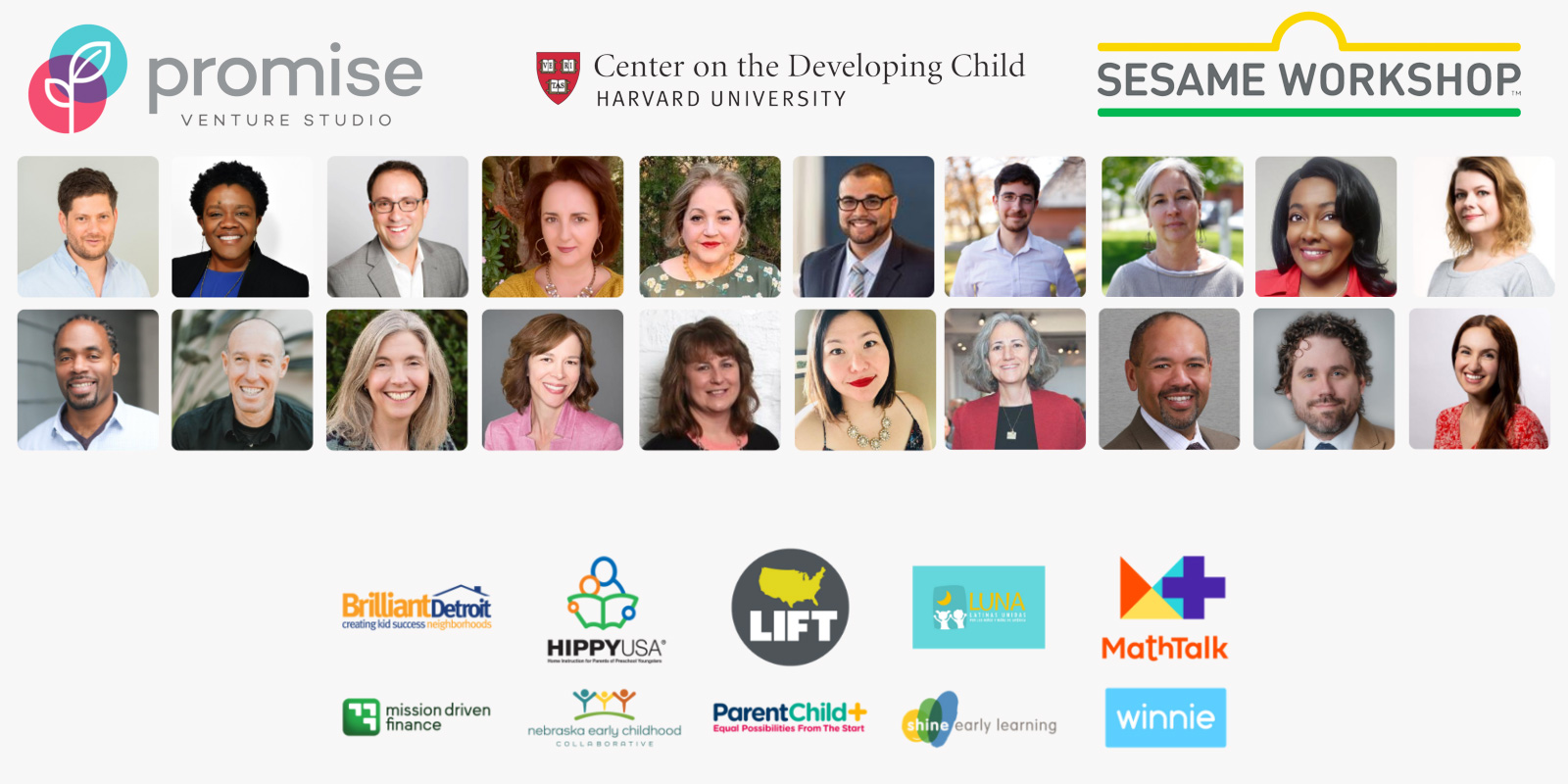Because we can’t take our Early Learning Nation Studio on the road during this time, stay tuned as ELN recaps Top Takeaways from important conversations, town halls, webinars and virtual events from the Early Learning field. Read them all and join the conversation! And visit our Early Learning Nation channel on YouTube for interviews with leaders from education, child development, business, politics and more.
On January 27, Promise Venture Studio hosted a “Show+Tell” in partnership with Sesame Workshop and The Center on the Developing Child. The showcase featured 10 companies and the social entrepreneurs in the 2020 Promising Ventures Fellowship Program.
Promise partners Michael Dougherty and Corey Zimmerman co-hosted the event. Dr. Joan Lombardi (Director, Early Opportunities, LLC), Steve Youngwood (CEO, Sesame Workshop) and Akimi Gibson (VP and Education Publisher, Sesame Workshop) were special guests.
Acknowledging the challenges of 2020, Dr. Lombardi said, “While we’ve got a lot of work ahead of us to recover and rebuild, events like this one renew our spirit and give us hope.” Youngwood spoke about Sesame’s start in a similarly turbulent time, the late 1960s, “Back then TV was proving to be captivating to children, so Sesame Street was created to use that innovation to extend early learning to every child.”
Below are our top four takeaways and notes about the companies looking to scale their impact to meet the specific challenges of today.
1. Community connections accelerate change
- LIFT, a national nonprofit that brings together dedicated volunteers and low-income parents of young children, is a leading proponent of two-generation anti-poverty solutions. LIFT pairs a two-year coaching program with cash payments to support parents to meet emergency needs and attain personal goals. The results: 65% of parents reduce stress, 94% of families increase economic security and 95% build trusting relationships.
- Math is often lacking in early education. One study showed only 58 seconds were dedicated to math in a six-hour preschool day. Further, 93% of adults in the U.S. report some level of math anxiety. MathTalk aims to transform environments into “mathscapes,” empowering adults and teaching children to explore math through play. MathTalk is a digital tool that can be used indoors and out, with augmented reality add-ons.
- In Detroit, 60% of young children live in poverty and many are unprepared for kindergarten or reading at grade-level. Brilliant Detroit transforms abandoned houses into neighborhood child care hubs in partnership with surrounding residents and existing program providers.
2. Quality resources are essential for sustainable businesses
- Shine Early Learning offers training and technical assistance programs for child care providers. Tailored self-assessments, professional networks, centralized resources and personal coaching build competency and behavioral change, leading to more effective interactions with children.
- Increasing numbers of parents are searching for care online, but more than 50% of daycares have little to no online presence. Winnie, a marketplace for daycare and preschool used by millions of families across the U.S., supports all parties by providing a platform for showcasing and finding child care businesses.
- Child care, unlike other critical social sectors such as health care and senior housing, lacks real estate investment trusts (REITs) that bring capital and dedicated property development. Mission Drive Finance launched the community real estate investment trust (cREIT) to help expand the nation’s child care supply by providing the institutional capital, capacity and community resources that providers need.
3. Help is on the way for home-based providers
- Latinas represent 25% of home-based workforce. Luna supports the licensing and professional development needs of Latina home-based educators to build the child care supply in underserved communities. Spanish-language training and coaching is designed for different learning styles and digital literacy levels.
- In the last five years, 43% of home-based child care professionals have left the industry. Working in isolation with limited access to technology and other essential services can be challenging, especially while tending to their top priority, caring for children. The Nebraska Early Childhood Collaborative responds to these challenges with their statewide network that combines technology and other services to support home-based providers. The services collectively lead to higher revenue, reduced isolation and increased educator retention.
4. Resiliency is a muscle
“One in four children under the age of six suffers from one or more traumatic experiences,” Gibson said, citing food insecurity and racial injustice as examples. “High-quality interactions and relationships, and attending to children’s social emotional learning, work together seamlessly to deepen children’s capacity to be resilient.” These final two companies do just that.
- Each year, 60% of children enter kindergarten unprepared academically, socially or emotionally. Hippy USA is an evidence-based home visiting program that is free for parents. Trained parent-partners teach caregivers strategies to individualize the experience based on interest, abilities and personality.
- Parent Child+ breaks the cycle of poverty by working one-on-one with family, friends and neighbors (FFN), and family child care (FCC) providers. In individualized coaching sessions, staff model quality interactions, share educational enrichment materials and encourage family engagement.
Search the Venture Database for contact information, videos and pitch decks, and subscribe here for updates from Promise Venture.

Mark Swartz
Mark Swartz writes about efforts to improve early care and education as well as developments in the U.S. care economy. He lives in Maryland.



